The Dog Delusion
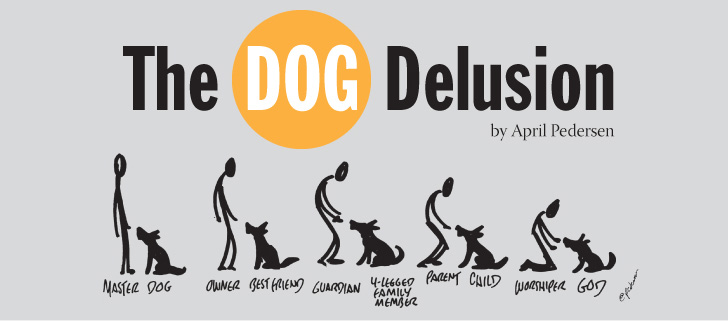
There was a time when “Dog is my co-pilot” was merely a fun slap at the “God is my co-pilot” bumper sticker, and it was funny precisely because nobody would ever think to elevate their dog to such a height. Within the past decade, however, pets—primarily dogs—have soared in importance. (“Dog is my co-pilot” is now the slogan of Bark, a magazine of dog culture, and the title of an anthology—published by Bark‘s editors—billed as essays, short stories, and expert commentaries that explore “every aspect of our life with dogs.”) Canines, with their pack instincts and trainability, are by far the most likely pet to be anthropomorphized as a family member, a best friend, or a “fur baby,” treated accordingly with gourmet meals, designer apparel, orthopedic beds, expensive therapy, and catered birthday parties. Some people even feel (and in some cases, demonstrate) that their dogs are worth dying for. Others say the animal lovers are going too far.
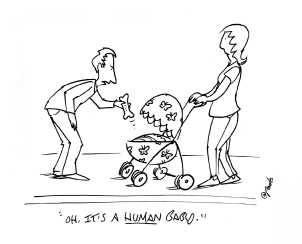 In a Pew Research Center study, 85 percent of dog owners said they consider their pet to be a member of their family. However the latest trend is to take that a step further in seeing the animal as a child. A company that sells pet health insurance policies has dubbed the last Sunday in April is “Pet Parents Day.” Glance through magazines like Bark, Cesar’s Way (courtesy of “Dog Whisperer” Cesar Millan), and other mainstream publications, and the term “pet parent” crops up regularly. The “my-dogs-are-my-kids” crowd isn’t being tongue-in-cheek, either. They act on their beliefs, buying Christmas presents, photos with Santa, cosmetic surgery, and whatever-it-takes medical care for their animal. In fact having a puppy, claimed one “mother,” is “exactly the same in all ways as having a baby.” And while pushing a dog around in a stroller would have gotten you directions to a mental health facility twenty years ago, today it’s de rigeur to see a canine in a stroller (or a papoose), and some passersby are downright disappointed to discover a human infant inside.
In a Pew Research Center study, 85 percent of dog owners said they consider their pet to be a member of their family. However the latest trend is to take that a step further in seeing the animal as a child. A company that sells pet health insurance policies has dubbed the last Sunday in April is “Pet Parents Day.” Glance through magazines like Bark, Cesar’s Way (courtesy of “Dog Whisperer” Cesar Millan), and other mainstream publications, and the term “pet parent” crops up regularly. The “my-dogs-are-my-kids” crowd isn’t being tongue-in-cheek, either. They act on their beliefs, buying Christmas presents, photos with Santa, cosmetic surgery, and whatever-it-takes medical care for their animal. In fact having a puppy, claimed one “mother,” is “exactly the same in all ways as having a baby.” And while pushing a dog around in a stroller would have gotten you directions to a mental health facility twenty years ago, today it’s de rigeur to see a canine in a stroller (or a papoose), and some passersby are downright disappointed to discover a human infant inside.
Who’s to say what a pet’s value is (aside from the purchase price)? Shouldn’t people be free to spend whatever they want on things for their dog? What real harm is there in believing one’s schnauzer is a “child who never grows up?” The implications are more ridiculous and far reaching than you might expect. Take the widely held notion that dogs give us unconditional love and nonjudgmental loyalty. Praising dogs for being incapable of acting like bad people is not only junk logic, it turns the animal into an idealized (godlike?) version of ourselves, to be rewarded with all manner of pampering. How can the comparatively complex human being compete with creatures said to exude unwavering faithfulness, forgiveness, trust, love, and innocence? Pets are pegged as more loving, more pure, more giving, more devoted. They are implied to be our moral superiors for not stealing money, starting wars, or judging people by their physical appearance. They accept us for who we are, while we come across as scheming, judgmental malcontents who love on condition only. I have quite a collection of misanthropic utterances from dog lovers, most along the lines of “I’ll take dogs over humans any day,” and “dogs love without having an agenda!” It’s no surprise that many dog lovers would rather be stranded on an island with a dog than with their spouse (or with any other person for that matter). Then there’s the CEO who said he doesn’t trust clients who don’t have pets. How sadly similar to the religious who say they don’t trust nonbelievers.
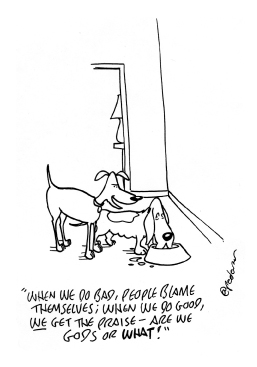
Further undermining humans, dogs trained for various tasks are routinely referred to as soldiers, officers, actors, therapists, heroes, or athletes. But a police dog simply can’t know the moral difference between a stash of cocaine and an old sock. One of the most absurd examples of anthropomorphism I’ve seen was a funeral for a drug-sniffing dog. The sheriff’s department went all out with a motorcade, flag-draped casket, bag pipers playing “Amazing Grace,” a eulogy from a pastor, and a rose-adorned easel on which the dog’s portrait rested. Officers from all across the Western United States paid their respects, and the service received heavy local media coverage. All this for an animal that couldn’t even grasp what a “law” was.
“Dogs are for people who can’t have kids,” a gay newspaper columnist told me recently. It’s true that homosexual (and straight) couples who can’t or don’t want children of their own often migrate towards dogs as child substitutes and view the arrangement as a different kind of family, but a family nonetheless. Such dog-based “families” may at first blush seem benign or even beneficial. After all, people with a family mentality are more likely to form stable, safe neighborhoods and have a vested interest in the community. Those without children may benefit from nurturing a living creature and learning to be less self-centered. But doesn’t it make more evolutionary sense to want to care for the young of your own species over another species? Couples without kids for whatever reason could still opt to be foster parents, mentors, or Big Brothers/Sisters to make a positive difference in a child’s life instead of funneling all their concerns into dogs. And what about devoting one’s time to saving endangered species of animals (whose survival also affects that of humans)?
Yet each day dogs gain more and more importance, protection, and access to realms once reserved for humans. Michigan is considering a bill that would allow pet care as a tax write-off. What’s next? Dogs counted as residents in the U.S. Census?
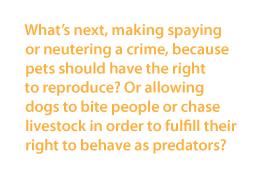 This shift in the status of dogs hasn’t gone unnoticed by animal rights advocates. Already thirteen U.S. cities have ordinances that ditch “pet owner” for “pet guardian.” The change is intended to be merely symbolic, its fans claim. If so, why make the effort? I worry it’s a foot in the door to gradually desensitize society to the outlandish idea of pets being the equals of minor children. Allowing ourselves to glance down the slippery slope, we might foresee absurd lawsuits over injuries to pets, murder charges for those suspected of negligence in a pet’s death, and laws requiring guardians to strap their fur kids into car seats, or to walk them twice a day, or giving any number of rights to the animals. Recently dog owners have begun to demand off-leash beaches and trails, under the premise that dogs have a “right” to run free. What’s next, making spaying or neutering a crime, because pets should have the right to reproduce? Or allowing dogs to bite people or chase livestock in order to fulfill their right to behave as predators? Where would the “pet” line for special status be drawn? At gerbils? Ferrets? Canaries? Hermit crabs? The funny part is, not even the pet industry can decide if pets are children or property. In ads hawking pet supplies, dogs and cats are promoted as family members, loved ones, and babies. Yet the defense strategy, if sued over, say tainted pet food or a defective squeaky toy, is to focus only on the economic aspect of the pet.
This shift in the status of dogs hasn’t gone unnoticed by animal rights advocates. Already thirteen U.S. cities have ordinances that ditch “pet owner” for “pet guardian.” The change is intended to be merely symbolic, its fans claim. If so, why make the effort? I worry it’s a foot in the door to gradually desensitize society to the outlandish idea of pets being the equals of minor children. Allowing ourselves to glance down the slippery slope, we might foresee absurd lawsuits over injuries to pets, murder charges for those suspected of negligence in a pet’s death, and laws requiring guardians to strap their fur kids into car seats, or to walk them twice a day, or giving any number of rights to the animals. Recently dog owners have begun to demand off-leash beaches and trails, under the premise that dogs have a “right” to run free. What’s next, making spaying or neutering a crime, because pets should have the right to reproduce? Or allowing dogs to bite people or chase livestock in order to fulfill their right to behave as predators? Where would the “pet” line for special status be drawn? At gerbils? Ferrets? Canaries? Hermit crabs? The funny part is, not even the pet industry can decide if pets are children or property. In ads hawking pet supplies, dogs and cats are promoted as family members, loved ones, and babies. Yet the defense strategy, if sued over, say tainted pet food or a defective squeaky toy, is to focus only on the economic aspect of the pet.
Viewing dogs as our children extends to risking life and limb to save them as well. What would evolutionary psychologists make of healthy people of reproductive age leaping to their deaths into scalding hot springs, icy rivers, or smoke-filled infernos in an attempt to rescue a possibly neutered animal? Among surveyed pet owners, 93 percent, which includes the young and childless, would do just that. Of course, most dog owners fully expect their pet to save them, Lassie style, should the need arise. But if not trained for rescue work, most dogs would simply stare, hide, or eat the contents of their owner’s picnic basket as their master sinks under the lake’s surface. Cases abound where pets happen to save people from perilous situations, but they, the pets, were acting as animals, not as humans.
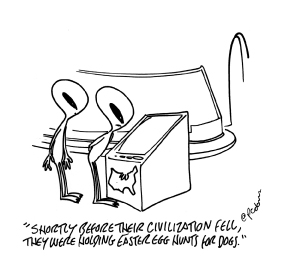 One can always argue that, from an environmental perspective, the pets-as-kids thing makes sense. With the human population reaching unsustainable numbers, pets can fill our desire to nurture without adding to the surplus of humans. Even so, dogs still eat a lot and produce a lot of waste (which has to be cleaned up unless the status lift requires potty training). And don’t forget that dogs have to come from somewhere, and parents will show preferences for certain breeds. Puppy mills would be happy to meet the increased demand for dogs, if it can be considered ethical in the best of circumstances to take puppies away from their mothers and litter mates and give them to another species to raise them. Interestingly, our popular pets such as the domestic dog play no balancing role in any ecosystem; they are human-developed and human-maintained. Even feral dogs prefer to hang around our villages, urban areas, and garbage dumps instead of returning to the woods to dance with wolves. And if too many people opted against having children in favor of pets, the result couldn’t be good for economies; children are the future workforce, consumers, voters, tax payers, innovators, you name it.
One can always argue that, from an environmental perspective, the pets-as-kids thing makes sense. With the human population reaching unsustainable numbers, pets can fill our desire to nurture without adding to the surplus of humans. Even so, dogs still eat a lot and produce a lot of waste (which has to be cleaned up unless the status lift requires potty training). And don’t forget that dogs have to come from somewhere, and parents will show preferences for certain breeds. Puppy mills would be happy to meet the increased demand for dogs, if it can be considered ethical in the best of circumstances to take puppies away from their mothers and litter mates and give them to another species to raise them. Interestingly, our popular pets such as the domestic dog play no balancing role in any ecosystem; they are human-developed and human-maintained. Even feral dogs prefer to hang around our villages, urban areas, and garbage dumps instead of returning to the woods to dance with wolves. And if too many people opted against having children in favor of pets, the result couldn’t be good for economies; children are the future workforce, consumers, voters, tax payers, innovators, you name it.
Let’s outsmart dogs a little by cutting back on the over-the-top stuff. The dogs won’t notice. Funds spent on a dog’s blueberry facial or in-room canine massage at a swanky hotel ($130 an hour) are about as close to setting a pile of cash on fire in front of a destitute person as I can imagine. Ditto on buying a sweater for an animal covered in fur, or a carob-coated eclair for a scat eater, or personalized cookies for the species that can’t read (that would be all species except us). Certainly dogs can’t visualize themselves as Homo sapiens of any age, and are becoming obese and even ill-mannered at the hands of their besotted owners. It makes no sense whatsoever to pour so much time, money, and emotion into an animal whose main “goal” in life is to leave its scent on a tree. Think about it—how would you like to be a dog? To be unable to talk, write, or question. To look upon a masterpiece of art without an ounce of admiration, to gaze at the starry night without an iota of wonder, to see a book and have not the slightest inclination to open it, or stare without comprehension at a voting booth.
It’s fine to enjoy a pet. I’ve had several myself, including a cat that lived eighteen years. When his kidneys failed, a $12,000 kidney transplant was off the radar (a case can be made that such surgery on an animal is unethical anyway), and I didn’t consider him to be my son. This need not diminish pets. We can enjoy them for what they are, without the anthropomorphic delusion.
